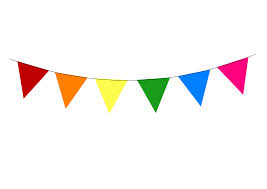bunting
英 [ˈbʌn.tɪŋ]
美 [ˈbʌn.t̬ɪŋ]
- n. 触击;旗布;白颊鸟
- v. 顶撞(bunt的ing形式)
- n. (Bunting)人名;(英)邦廷

记忆方法
记忆“bunting”的方法可以是将它分解为两个部分:“bun”和“-ting”。想象“bun”像面包卷一样柔软蓬松,而“-ting”可以联想到“tingle”或“bounce”,表示轻盈欢快地摇摆。结合这两个部分,可以想象一个像面包卷一样轻盈的装饰品在风中轻轻摇曳,这样的场景有助于记忆“bunting”一词,因为它通常指的是用彩布或纸制成的装饰品,如庆祝活动或节日悬挂的灯笼或旗帜。
以上内容由AI生成, 仅供参考和借鉴
中文词源
bunting 彩旗
词源不详。可能来自词根beau, 美丽,见beauty.
英语词源
- bunting
-
bunting: Bunting ‘bird’ [13] and bunting ‘flags’ [18] are presumably two distinct words, although in neither case do we really know where they come from. There was a now obsolete English adjective bunting, first recorded in the 16th century, which meant ‘plump, rounded, short and thick’ (could a subliminal memory of it have been in Frank Richards’s mind when he named Billy Bunter?).
Perhaps the small plump bird, the bunting, was called after this. The adjective probably came from an obsolete verb bunt, which meant (of a sail) ‘swell, billow’, but since we do not know where that came from, it does not get us very much further. As for bunting ‘flags’, the word originally referred to a loosely woven fabric from which they were made, and it has been conjectured that it came from the English dialect verb bunt ‘sift’, such cloth having perhaps once been used for sifting flour.
- bunting (n.1)
- "flag material," 1742, perhaps from Middle English bonting gerundive of bonten "to sift," because cloth was used for sifting grain, via Old French, from Vulgar Latin *bonitare "to make good."
- bunting (n.2)
- lark-like bird, c. 1300, bountyng, of unknown origin. Perhaps from buntin "plump" (compare baby bunting, also Scots buntin "short and thick;" Welsh bontin "rump," and bontinog "big-assed"), or a double diminutive of French bon. Or it might be named in reference to speckled plumage and be from an unrecorded Old English word akin to German bunt "speckled," Dutch bont.
权威例句
- 1. Red, white and blue bunting hung in the city's renovated train station.
- 红、白、蓝彩旗装点着该市修复一新的火车站。
- 2. The breeze grew in strength, the flags shook, plastic bunting creaked.
- 微风渐强,旗帜舞动起来,塑料彩纸吱吱作响。
- 3. Flags and bunting hung limply in the still, warm air.
- 空气暖暖的,也没有风,旗帜和彩旗无精打采地垂着。
- 4. Villagers decked the streets with bunting.
- 村民用彩旗装饰街道。
- 5. The city was gay with all colors of bunting.
- 这个城市到处飘扬着五色缤纷的旗帜.